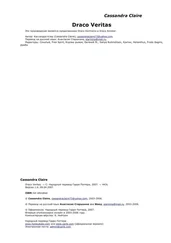J. Gregson - In Vino Veritas
Здесь есть возможность читать онлайн «J. Gregson - In Vino Veritas» весь текст электронной книги совершенно бесплатно (целиком полную версию без сокращений). В некоторых случаях можно слушать аудио, скачать через торрент в формате fb2 и присутствует краткое содержание. Год выпуска: 2012, Издательство: Severn House Publishers Ltd, Жанр: Полицейский детектив, на английском языке. Описание произведения, (предисловие) а так же отзывы посетителей доступны на портале библиотеки ЛибКат.
- Название:In Vino Veritas
- Автор:
- Издательство:Severn House Publishers Ltd
- Жанр:
- Год:2012
- ISBN:нет данных
- Рейтинг книги:4 / 5. Голосов: 1
-
Избранное:Добавить в избранное
- Отзывы:
-
Ваша оценка:
- 80
- 1
- 2
- 3
- 4
- 5
In Vino Veritas: краткое содержание, описание и аннотация
Предлагаем к чтению аннотацию, описание, краткое содержание или предисловие (зависит от того, что написал сам автор книги «In Vino Veritas»). Если вы не нашли необходимую информацию о книге — напишите в комментариях, мы постараемся отыскать её.
In Vino Veritas — читать онлайн бесплатно полную книгу (весь текст) целиком
Ниже представлен текст книги, разбитый по страницам. Система сохранения места последней прочитанной страницы, позволяет с удобством читать онлайн бесплатно книгу «In Vino Veritas», без необходимости каждый раз заново искать на чём Вы остановились. Поставьте закладку, и сможете в любой момент перейти на страницу, на которой закончили чтение.
Интервал:
Закладка:
‘And if that doesn’t work?’
Tom Bowles grinned. ‘He could try twisting his employer’s arm. Tell the boss that he’d take his valuable labour elsewhere unless he got more recognition, in the shape of a share of the ownership. But he’d need to be very confident he was indispensable before he risked that. A friend of mine tried it and was looking for a new job the next day.’
‘I’ll pass on what you say,’ said Jason glumly.
‘I must be on my way,’ said Tom Bowles with a glance at his watch. ‘All the best in the next round of the knockout.’
‘Thanks, Tom. And all the best in the new job and at Sunningdale.’
The bar was quiet at this time. Jason Knight bought himself another drink and sat quietly for a while, digesting the results of their discussion. He told himself not to be disappointed — this was surely what he had expected to hear. He had already known in his heart of hearts what the harsh facts of the situation were.
Martin Beaumont wasn’t an owner prepared to listen to reason, to share his power with the man who was steadily building it up for him. If Jason was going to get the share of the business he wanted, he was going to have to use more than mere reason. Something much harsher would be needed.
FOUR
Tom Ogden’s family had farmed this land for almost four hundred years — since the area had been rent by the civil war which had resulted in the death of Charles I and the brief rule of Lord Protector Cromwell.
Tom had watched the spread of Abbey Vineyards beside him with interest — farmers are conservative folk, and a completely new use of land always seems more risky to them than to anyone else. That interest changed first into a vague feeling of unease; this was rapidly followed by the outright apprehension which a small landowner always feels with the spread of a bigger and more prosperous neighbour. Yet Ogden had been glad to sell the highest and least productive part of his land to Martin Beaumont in the early days of the vineyard. The money had enabled Tom to convert the fertile lowland area of his farm to intensive cultivation. He had opted for a new life of his own which to him seemed quite daring enough.
Tom Ogden was now a strawberry farmer, with long rows of plastic cloches stretching away across his fields and an influx of foreign pickers at the height of the season. Both of these developments had brought opposition from different sectors of the local population. This opposition had been accorded full voice in the Gloucester Citizen , which had many pages to fill each evening and was delighted to fan local controversy. The issue had then been taken up by local radio, and had even featured on Central Television news. Tom Ogden had been uncomfortable in the face of such publicity, but had affected to treat it with the sturdy indifference farmers customarily accorded to aesthetes and townies.
Tom now had half his fields converted to the increasingly popular ‘Pick Your Own’ option for his strawberries. People came out from the towns and villages of Herefordshire and Gloucestershire to pick his produce, often treating the expedition as a family outing. They had caused a little damage at first with their clumsy fingers and clumsier feet, but Tom had soon learned to limit that. The important thing was that they paid almost as much for his strawberries as the retail price in the shops, and far more than he could get from the markets or supermarkets. Children in particular tended to eat energetically whilst they picked, but Tom treated that as a necessary but minor evil, to be set against the lower overheads of selling on site. He was delighted with his profits, whilst his customers enjoyed the warm glow brought by physical exertion and then the flavour of strawberries which could not have been fresher.
On this bright April day, Tom Ogden was looking over the bent backs of his workers, as they weeded the rows and nourished the promising green fruits with a little fertilizer. He imagined the summer scene here, when he would be listening to children’s shrill cries to their parents, and congratulating himself on taking what had seemed an adventurous step into this new area of farming.
Ogden went out into the field and exchanged a few words with ‘Spot’ Wheeler, his foreman. No one, not even the man himself, was sure how he had acquired his soubriquet. He was Henry on his birth certificate, but he had answered to Spot for so long that no one knew any other forename for him. Spot had rarely ventured outside Herefordshire and had an accent far stronger than even Tom’s very noticeable one, so that any Englishman from more than fifty miles away found his speech difficult to follow. Yet, in some strange combination of sign and sound argot, which perhaps even he could not have explained, Spot managed to communicate effectively with the variety of mainly Eastern European workers who came each year to work in the strawberry fields.
Tom Ogden always enjoyed talking to Spot, feeling an affinity with a man who had the same roots as he had, whose family had worked the land as his had for hundreds of years. Though neither of them would have acknowledged it or voiced it, the bond between them was sealed by a sense of rank. Spot Wheeler accepted his lower station as labourer and now supervisor of labour as unthinkingly as Tom accepted his role as owner of the land and thus master of his workers’ destiny.
Spot gave his employer a brief report on the progress of cultivation and directed two of his newest workers to a new area with a series of guttural sounds; they nodded and bent anew to their work with the forks. Tom scratched his head, then shook it once again in happy wonderment at his foreman’s ability to communicate with his workforce.
It was at that moment that a cloud fell across his world. It was a metaphorical cloud, for the day was golden still with a steady sun, but a cloud nonetheless. Spot Wheeler said suddenly, ‘That chap be ’ere again, Mr Ogden,’ and Tom turned to see a figure outlined against the sun at the entrance to his fields. It looked to him for a moment like some great bird of prey, black and ominous against the sky.
‘I don’t know why. I’ve told him often enough there’s nothing for him here,’ said Ogden, turning his steps reluctantly towards the interloper.
‘Wonderful day, Tom!’ said Martin Beaumont, when Ogden got within ten yards of him. He forced the farmer to fall into step with him, turning his path along the edge of the strawberry fields. Tom had been intending to lead him quickly back to the exit and his car. ‘At least the sun and this southerly wind are fine for vineyards. I expect you’d like a little more rain to swell your strawberries. Temperamental crop, I believe. I shouldn’t like to rely on them for a living.’
Ogden resisted the farmer’s temptation to agree about the weather. It was one of the modern jokes that no season was ever exactly right for the farmer, but he did not wish to agree anything with this man. He said gruffly, ‘Nothing like as temperamental as vines, I should think.’
‘Oh, they’re much less difficult than most people imagine, once you get the hang of viniculture. Everyone else is moaning about global warning, but it’s helping us. And we’ve diversified as we’ve developed, you see, Tom. We’ve got quite a variety of grapes now, so that something’s pretty well bound to do well, even in a difficult season. One of the secrets of success in the agricultural industry, diversification. Now that I’ve got used to diversity, I shouldn’t like to be dependent on a single crop for my livelihood.’ He looked sideways over the long rows of plastic cloches and the bent backs of workers in the open areas beyond them. ‘Must be pretty labour-intensive, strawberries. Not a good thing, nowadays, with men likely to let you down the moment they get a better offer.’
Читать дальшеИнтервал:
Закладка:
Похожие книги на «In Vino Veritas»
Представляем Вашему вниманию похожие книги на «In Vino Veritas» списком для выбора. Мы отобрали схожую по названию и смыслу литературу в надежде предоставить читателям больше вариантов отыскать новые, интересные, ещё непрочитанные произведения.
Обсуждение, отзывы о книге «In Vino Veritas» и просто собственные мнения читателей. Оставьте ваши комментарии, напишите, что Вы думаете о произведении, его смысле или главных героях. Укажите что конкретно понравилось, а что нет, и почему Вы так считаете.










